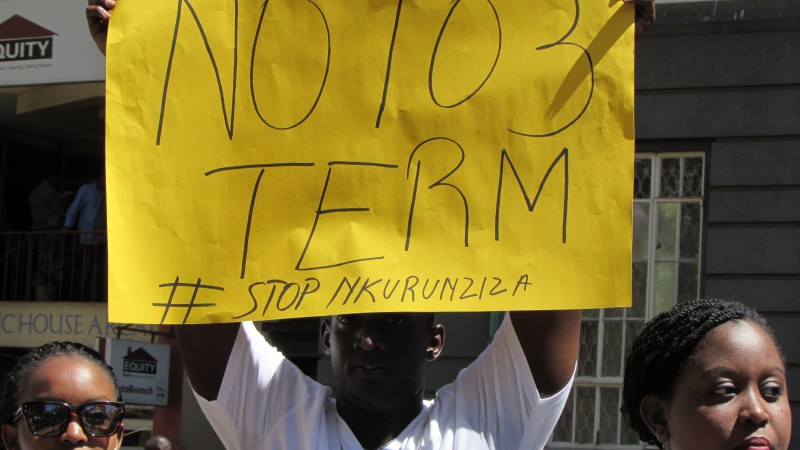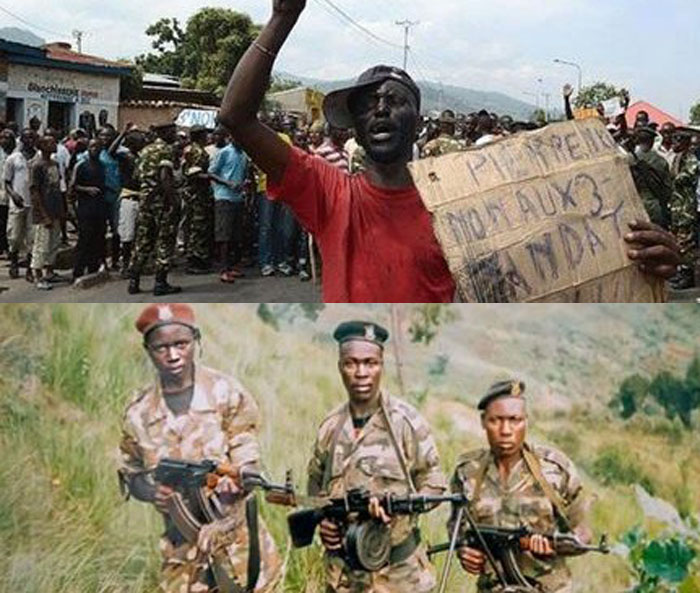
Burundians living in Nairobi, Kenya and friends of Burundi says no to a third term for President Pierre Nkurunziza. Photo by Vincent Munga. Copyright Demotix
Burundi has been in crisis since April, but the country is still too rarely mentioned in international media. However, in the last two weeks of October, the level of violence and random assassinations have reached proportions that make crisis observers fear the worst.
As a reminder, President Pierre Nkurunziza was reelected in 2010 as the head of the country. The constitution of Burundi forbids presidents from running for a third term. On 25 April 2015, Nkurunziza announced that he would run for a third consecutive term in the 2015 Burundian presidential elections. On 5 May, the Constitutional Court validated his candidacy.
Demonstrations erupted throughout the country to protest this decision. At least 22 demonstrators have died. On 13 May, General Godefroid Niyombare announced that he would take power while President Nkurunziza was visiting Dar-es-Salaam in Tanzania.
On 14 May, the military coup failed in its attempt to take control of the national radio and television station RTNB. That evening, Pierre Nkurunziza's staff announced that Nkurunziza would return to Burundi and retain his position as head of country.
On 21 July, Nkurunziza ran in the elections and won 69.41% of the vote. This election, however, did not stem the tide of the crisis. Thousands of refugees left Burundi for Tanzania fearing armed conflicts to come.

“Pierre, we say no to three-term president.” Image compilation illustrating the crisis in Burundi in 2015
On the Burundian website Les Voix, reporter Ngabire Elyse had a discussion with renowned Burundian political actor Aimé Magera about possible solutions to Burundi's crisis:
Aimé Magera constate que les dirigeants actuels n’ont presque rien gardé de l’expérience du passé récent de notre pays : « Ils sont entrain de marcher exactement dans les pas d’un ancien régime qui les a précédés juste avant que le vent de la démocratie ne souffle dans le paysage politique burundais en 1992. ” Dans un contexte où les cœurs sont déjà meurtris par les longs mois de manifestations réprimées dans le sang, des enlèvements, tortures, assassinats, découvertes des cadavres ligotés ou emballés dans des sacs et abandonnés le long des routes ou jetés dans des rivières, etc., la commission (de reconciliation) telle que définie par le décret qui l’a créée, n’apportera rien de nouveau.
Aimé Magera notes that current leaders have learned almost nothing from the recent affairs of our country. “They are following precisely in the footsteps of a former regime that preceded them just before the wind of democracy blew through the political landscape of Burundi in 1992.” [Editor's note: From 1987 to 1992, Burundi was under military ruling led by Major Pierre Buyoya. The first open elections happened in 1993 and were won by Melchior Ndadaye] In a situation where hearts are already bruised by long months of demonstrations suppressed in blood, kidnappings, torture, murders, bodies discovered bound hand and foot or wrapped in bags and left along the roads or thrown in rivers, etc., the reconciliation commission (as defined by the order that created it) will bring about nothing new.
On Waza Afrique, the creator of the Facebook group “Emploi à Bujumbura / Jobs in Bujumbura” Landry Sibomana gave his opinion on the crisis that permeates his country:
Les causes sont multiples : politiques, économiques, sociales, etc. Ce qui m’attriste, c’est surtout les pertes en vies humaines, les dégâts matériels, mais aussi cette inquiétude et incertitude du lendemain qui se lit sur les regards des gens. La vie tourne au ralenti. C’est regrettable. La jeunesse est une ressource extraordinaire pour une nation et s’en occuper devrait être une priorité. Beaucoup de jeunes se sont laissés embrigader dans des aventures dangereuses qui, finalement, ne font que leur coûter la vie. Et là, c’est toute la nation qui perd. je pense que les acteurs concernés devraient s’asseoir et dialoguer et penser à l’intérêt commun, qui est la paix et la sécurité pour tous. Qu’on le veuille ou non, tout le monde est victime.
The reasons are numerous: political, economic, social, etc. What saddens me most of all are the losses in human life, the material damage, but also the anxiety and uncertainty of tomorrow on people's faces. Life moves in slow motion. It's unfortunate. Youth is an extraordinary resource for a nation and it should be a priority. Many youths let themselves get caught up in dangerous adventures which, ultimately, only cost them their lives. In the end, it is the whole nation that loses. I think that the concerned parties should sit, discuss, and think about the common interest that peace and security are for all. Whether they like it or not, everyone is a victim.
In effect, thousands of Burundians find themselves on the road fleeing confrontations and more and more frequent witch hunts. This report from Al Jazeera -The Stream explains the resurgence of violence in recent months:
Valentin Vyabagabo, a resident in North Bujumbura, maintains that he has seen bodies floating regularly in the river since September.
In the face of growing ethnic tensions, Roland Rugero of Bujumbura notes that this crisis has multiple factors:
Dans dix ans, le Burundi aura plus de huit millions de demandeurs d’emplois, sur plus de 13 millions d’habitants. La résolution de la crise de 2015 ne doit pas faire oublier à tous les intervenants politiques et sociaux, locaux ou amis du pays, l’essentiel : si la population burundaise reste pauvre, avec tous les problèmes liés à une forte démographie et l’exiguïté des terres, le pays aura toujours et encore des violences cycliques. La crise burundaise renvoie à des frustrations économiques, sociales et politiques profondes : les jeunes qui ont fourni l’essentiel des contingents de manifestants sont les jeunes chômeurs, les travailleurs précaires, les jeunes ruraux désœuvrés en quête d’espoir en ville, mais aussi la majorité des étudiants qui rejettent tous un ordre politique et social qui les condamne durablement à la misère et au chômage, à un avenir sans perspective. Ils dénoncent un pouvoir incapable de répondre à leurs aspirations économiques et sociales. Cette impuissance n’est pas propre à ce régime.
In ten years, Burundi will have more than 8 million job-seekers out of more than 13 million inhabitants. The solution to the 2015 crisis must not make us forget all of the social and political players, local or allies. The crux of the matter is that if the Burundian population remains poor, with all of the problems that come with a large population and a small territory, the country will always have violent cycles. The Burundian crisis renews economic, social, and profound political frustrations. The youth who comprise the core contingents of the demonstrators are the unemployed, those with insecure employment, the idle rural youths looking for city life, and the majority of students who reject all political and social order that condemns them to long-term misery, unemployment, and a future without prospect. They denounce a power incapable of responding to their economic and social aspirations. This helplessness is not specific to this regime.







2 comments